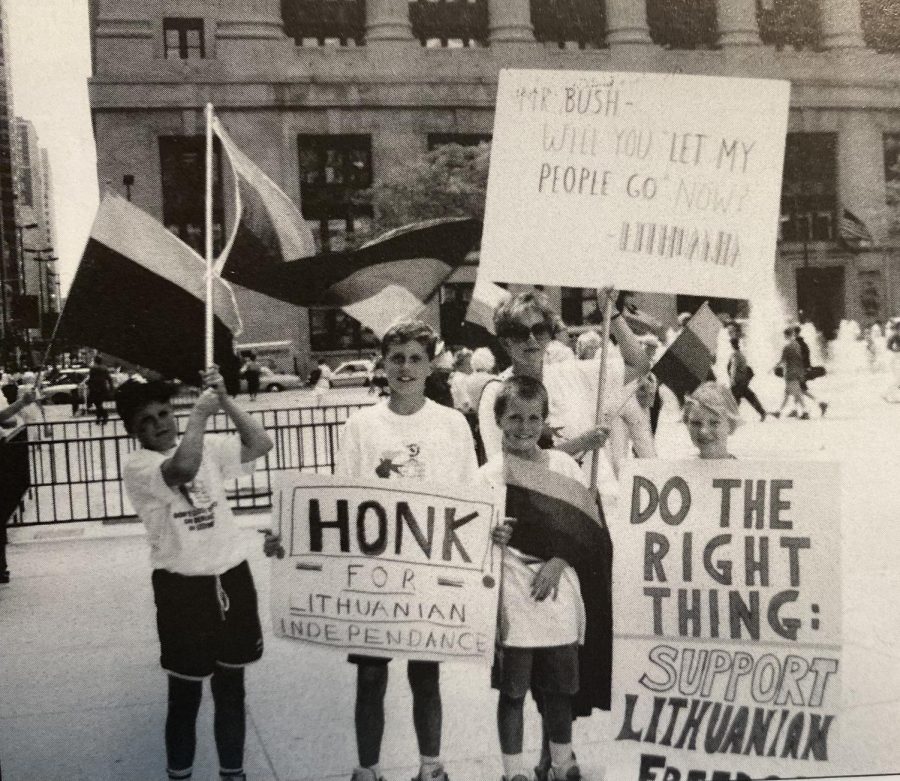Photo courtesy of Justin Riskus
On the far left, Justin Riskus stands with the Lithuanian flag in March of 1990 at a Chicago rally to support Lithuanian’s strive for independence.
Lithuanians never forgot that the U.S. supported their efforts for freedom
Justin Riskus, a social studies teacher at York, has deep roots in the Eastern European country of Lithuania. Lithuania was the first Soviet Republic state to re-establish independence from Moscow. His family history in Lithuania is incredibly interesting from both parents’ history.
“On my mom’s side, my great grandfather was arrested by the Soviets in 1940 because he had served in the Lithuanian Army; his year-long imprisonment ruined his health,” Riskus said. “My grandfather was separated from his family at the age of 16, when the Germans took him to help dig anti-tank trenches. He ran away and ended up in a displaced person camp at the end of the war.”
On his paternal side, Riskus’ family history actually began in Russia. His family immigrated several times as they moved from Russia to Lithuania and then to the United States.
“My grandfather was Lithuanian but born in Chita, Russia,” Riskus said. “When Lithuania won its independence in 1918, and because of the violence caused by the Russian Revolution, my great grandfather took the family back to Lithuania.”
The Soviets had a devastating impact on the family at several points in their history. Each generation consisted of several children which made staying together difficult.
“Two daughters [of my great grandfather] who were already married stayed behind in Chita, and were probably executed by the Soviet government in the 1930s,” Riskus said. “When the Soviets came back in 1944, my grandfather made the decision to leave Lithuania.”
When leaving Lithuania, his maternal grandparents were able to stay together, however, the siblings had more difficulty in doing so.
“My grandmother had seven brothers and sisters. Half of them stayed behind for various reasons,” Riskus said. “One of her brothers fought against the Soviets as a partisan and spent five years hiding from the authorities in the cellar of their home. She did not see her family again until 1987.”
Riskus grew up going to protests and rallies to protest the Soviet infiltration of Lithuania and during the downfall of the Soviet Union.
“For Lithuanian-Americans, preserving Lithuanian culture while the country was occupied by Russia was a big deal,” Riskus said. “ After Lithuania declared its independence in 1990, and the Soviet Union collapsed, I remember being embarrassed when my dad called my school to insist that they needed new globes that no longer showed the Soviet Union. But in hindsight I agree with him!”
With deep roots in Lithuania but having an entire upbringing in America, Riskus witnessed the differing values and customs between the two countries.
“Living in the U.S. it is easier to remove oneself from learning about what’s going on in the world,” Riskus said. “Because of my family history, this was not true for me.”
The involvement in Lithuania of the United States in recent history is often forgotten by many Americans. As a global superpower, Americans benefit from greater stability and security at home with little to no threats from larger neighbors.
“Lithuanians never forgot that the U.S. supported its efforts for freedom – the Grateful Dead even sponsored the Lithuanian basketball team at the 1992 Barcelona Olympics,” Riskus said. “NATO for Lithuania was a godsend, and the same is true for other nations that used to be part of the Soviet Union or were behind the Iron Curtain.”
Internationally, the aid the United States gives provides immense relief and reassurance to citizens and governments in the middle of conflict. However, our homeland provides much relief for many who manage to escape these conflicts.
“Historically, the U.S. has also been a safe haven for millions of people fleeing war and oppression,” Riskus said. “I have deep empathy for refugees because that was my grandparents 70+ years ago.”
As a result of his deep connection with Eastern Europe, Riskus maintained a strong relationship with the events playing out overseas.
“Hospitals are being intentionally shelled, fleeing civilians are being targeted by the Russian military. Many Ukrainians are now having to make the same decision my grandparents did back in WWII, which is very sad,” Riskus said. “Millions of Ukrainians are fighting to keep their country free, and many are going to die. Much is at stake- Slava Ukraini!”

